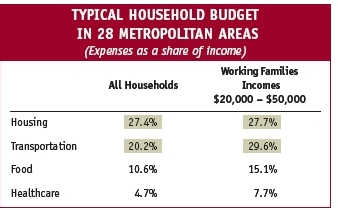Towards a DC centric transportation policy (within the regional context)

From the A Heavy Load report.
The Smart Growth America e-newsletter, via a piece in the Atlanta Journal-Constitution, calls our attention to a report from the Center for Housing Policy, "A Heavy Load: The Combined Housing and Transportation Burdens of Working Families," which calculates the total cost of housing plus transportation, when considering affordability.
One thing that shocks me is that it says the average low to moderate income household in the Washington region spends $9,625 annually on transportation (page 4 of the report). Granted there is a housing/jobs imbalance, especially if one is under-educated, but that amount seems high.
I spend less than $1,250/year--and about $400 is the cost of maintaining a bicycle. I am not counting occasional spending for rental cars for trips out of the region, and I am including car sharing. My GF spends maybe $1,500/year, but $1,000 is covered by TransitCheck, so that cuts it down to $500.
Note that the Surface Transportation Policy Project has a couple papers on this subject too. They make the point that great transit systems reduce the cost of travel for people across all demographics, but especially among low to moderate income households. See "Driven to Spend: Pumping Dollars out of Our Households and Communities."
The reason that in my transportation and land use paper I suggest free surface transportation in the city (for bus and streetcar) -- and credit for my putting it in the paper goes in part to "Cableflame," a co-writer on the companion Dr. Transit blog -- is because of equity concerns almost more than increasing transit use.
Most fareless squares, such as in Portland, Seattle, and Pittsburgh, have been designed to reduce congestion in the downtown area, as well as to help the region meet air quality requirements. But providing free transportation to or within the core of the center city benefits higher income people the most, because they tend to have more of the jobs that are present in a central business district.
Providing free service throughout the city would be more equitable. It is also costly.
I can't say how much it would cost to provide free bus (and eventually streetcar) service only within downtown. I figure the additional cost for doing it for the entire city would be between $75 million and $80 million. This is just a rough calculation that is probably slightly overstated--I estimate that weekly farebox revenue is about $1 million. That's based on 400,000 trips in DC daily, M-F, but we don't know how many are "unlinked" and how many are transfers or otherwise reduced fares.
The way to pay for this and other transit expansion is through a payroll withholding tax on income earned in DC. It would function just like how Social Security is collected. This is done in four counties in Oregon.
Depending on the assessable percentage (say between .005 and .00625), it could generate upwards of $200 million annually.
However, pumping $80 million of that into free bus service might be too much and not have the kind of return on investment that we need. Alternatives could be to reduce the cost of bus service slightly or to not increase fares, while putting the money into improving bus service in many ways (also in the paper) as well as expanding neighborhood-based bus feeder services, and streetcar and subway expansion projects within the city proper.
Of course, such a tax, given that 70% of the workers in the city do not live in the city, would be called a commuter tax and it would be difficult to get Congress to sign off on it. In order to get it through, some improvements in road access to the city from Maryland and Virginia would probably have to be provided as well.
Labels: transportation planning



0 Comments:
Post a Comment
<< Home